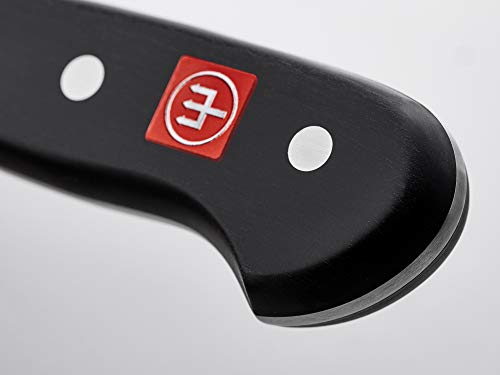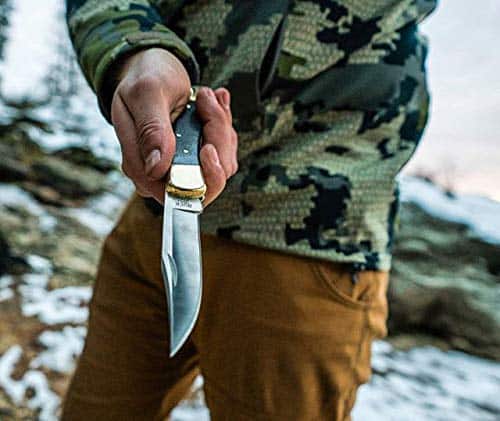When you’re looking for an excellent kitchen knife, or perhaps even a full set of kitchen cutlery, it’s often easier to look for a great knife brand instead of a specific blade. That’s because finding an excellent knife maker allows you to use that brand for all your future knife needs. You may only need a chef’s knife right now, but what if you need a cleaver or a paring knife in the future? Finding a great brand saves you time and guarantees quality for all your future blade purchases.
The good news is that there are several high-quality knife makers across the world, most of them from either Germany or Japan. However, finding the right knife maker for your needs can be tricky if you don’t have the time or money to try out a blade from each brand yourself. Fortunately, we’ve already found the best knife makers and presented them below.
Wusthof 
Wusthof is quite an easy choice if you’re ever in the market for a top-tier kitchen knife. Wusthof, arguably the best knife making company in Germany, is based out of Solingen: a town known around the world for its knife-making traditions.
Wusthof produces aesthetically simple but quite durable knives using a patented 40-step process that involves hand-made elements and robotic assistance. In fact, their factory makes heavy use of robots and laser-guided systems to ensure that they craft every blade with the utmost precision and superior quality. Perhaps because of this attention to detail, Wusthof knives benefit from extremely sharp angles: usually between 10° and 14° on either side.
The steel used for their knives is heated up to 2200°F and is comprised of a stainless steel mix that includes both high carbon steel and other elements like chromium and vanadium.
Furthermore, Wusthof knives are known for their hardness, hovering around 58 on the Rockwell Scale on average. They produce both forged and stamped knives and use either wood or synthetic materials for their handles. Most of their blades come with a full bolster to protect your fingers and a full tang for added balance, and the blades are riveted to their handles for added stability.
All in all, Wusthof produces high-quality and high durability knives for a variety of kitchen needs. The only downside is that many of their cutlery purchases are quite pricy. So their excellence comes at a premium cost.
Shun
Shun is a well-known Japanese knife making company, based in Seki City: the Japanese counterpart to Solingen, Germany. Shun has been making knives for hundreds of years and today creates its kitchen blades with a proprietary 100-step process. Even more importantly, Shun creates all their blades using hand-made techniques, including the finishing step. This ensures that every blade goes through lots of inspection before being finally shipped to you.
Their knives are sleek and exceptionally sharp, as well as lightweight and ergonomic to hold over long stretches of time. The knives are created with high carbon “super steels” that afford phenomenal edge retention, even though many other high carbon steel blends lose their edges too quickly. Furthermore, you’ll find that Shun knives are super resistant to corrosion damage and chip damage.
To make things even better, Shun knives are typically finished with either Damascus or hammered layers. These provide even greater durability and, in the case of the Damascus finish, give each blade a flowing or watery texture that makes them stand out from other kitchenware. Another practical benefit to these finishes is that it makes it harder for food to stick to the knife surfaces.
As with virtually all Japanese blades, Shun knives are super sharp and are ideal for precision work or for cutting through very soft food items. They aren’t as durable as something like a Wusthof knife, but that’s not what they’re designed for, anyway. You can get Shun knives that are more affordable or more expensive depending on your budget level.
Victorinox 
Victorinox is neither Japanese nor German; instead, they’re the Swiss knife making company renowned for creating the original Swiss Army knife. Although they’re a little cheaper on average than many Wusthof and Shun knives, Victorinox still produces fine cutlery for a variety of needs.
They create forged and stamped knives alike, and many of their knives benefit from an individual aesthetics that allow for graceful curves, colorful handles, and lightweight blades. As a result, many of their knives are extremely comfortable to hold, and you’ll notice that a majority of their handles implement at least some wood into their material instead of only using synthetic composites.
They also use high-quality stainless steel that protects the blades from corrosion damage and affords them significant hardness, usually around 56 on the Rockwell Scale. Their blades are also pretty sharp, averaging around 15° or 20° for every blade edge side.
Victorinox makes their knives using a proprietary manufacturing process involving heating the steel up to 2000°F and an additional annealing step, which helps eliminate problems in the steel material. Furthermore, they lab-test all of the materials before using them in knife production for added quality assurance.
To make things even better, plenty of Victorinox knives are more affordable for those who want to blend quality and price in equal measure. So they might be a great choice if you don’t want to break the bank but still need high-quality kitchenware for your next cooking adventure.
Zwilling J.A. Henckels 
Zwilling J.A. Henckels is also based in Solingen, Germany. They’re Wusthof’s primary Western competitor, in fact, and for good reason. Like Wusthof, they’ve been making knives for over 200 years and use high carbon and rust-resistant steel to provide phenomenal results for all of their blades.
They’re similar in many more ways, too. For instance, Zwilling J.A. Henckels also creates full bolstered and heavier than average kitchen knives that are both durable and well-balanced. This makes them ideal for chopping or cutting through multiple harder food items in rapid succession. The full bolster provides better protection for your fingers to prevent them from slipping onto the blade edges.
Compared to Wusthof, however, Zwilling J.A. Henckels usually manufactures their knives with slightly duller edges, averaging 15° or so most of the time. Their knives are also a little softer, though this arguably makes them a little more resistant to chipping damage.
However, Zwilling J.A. Henckels’s knives are a little more ergonomic, featuring a curve near the end of the handle to stop your hand from slipping and provide a comfortable grip. They use both wood and synthetic materials for their handles and have a few extra forged knives in their collections.
All in all, Zwilling J.A. Henckels is an excellent choice and is oftentimes slightly more affordable compared to Wusthof. In this way, you can consider them a compromise if you really like Western or German-style kitchen knives but don’t want to pay quite as much for a true Wusthof set.
Miyabi 
Miyabi is actually a company owned by Zwilling J.A. Henckels, though this business arrangement is mostly for the purposes of oversight and quality control. They still make their knives in Seki City, just like Shun, and still provide high-quality Japanese-style knives despite their corporate owner.
They follow Japanese traditions, using handcrafting methods to create their knives and providing some of the sharpest knives you can get on the market. Indeed, many of their blades feature a 9° edge on either side of the blade, which is sharper than even what Shun or other Japanese companies can make. This means that their knives are arguably the best choice for slicing through really soft food items.
They use a proprietary three-step sharpening process to ensure that the blade is perfect when it ships out to you. Of course, this does mean that you’ll need to sharpen or hone the blade edge fairly frequently, but that’s par for the course with really sharp and lightweight knives.
Miyabi’s knives also tend to be pretty hard, with many of their blades averaging Rockwell Scale ratings of around 62 or 63. They use high-quality stainless steel blends to provide exceptional durability and rust resistance. Furthermore, many of their blades benefit from Damascus-style finishes that add great aesthetics, although they aren’t quite as noticeable or dramatic as many Shun finishes. Their knives are made with wood-like synthetic materials that provide comfortable textures and are resistant to water damage.
Yoshihiro 
Yoshihiro has been creating kitchen cutlery for over a hundred years, although they only recently began offering their knives worldwide. They’re based in Southern California, so they’re technically not a true Japanese knifemaker (since you have to be based in Japan and oversee every step of the process there to count). However, they follow Japanese knife making traditions to ensure excellent quality regardless.
Interestingly, they create knives with a wide variety of steel materials, including several types of blue and white steel, along with stainless steel mixes like you would expect for high durability kitchen blades. This allows you to select more aesthetically unique knives from time to time, although you’ll need to place an order directly on their website instead of looking on normal markets like Amazon.
If you do decide to get a traditional stainless steel kitchen knife, you’ll benefit from high-quality steel materials that are ice-hardened for added durability (usually around a Rockwell rating of 60 or so) and sleek sharpness. Furthermore, many of their Japanese-style knives come with Damascus finishes, providing an even better look and more kitchen cutting convenience.
Many of their knives are even more beautiful than their competitors’ since the handles are often made with real wood or wood-resin composite mixtures. Plenty of their knives come with bolsters to protect your fingers, and several of their top choices even come with aesthetic sheathes so you can store the knives carefully when they’re not in use.
Ultimately, Yoshihiro may not be based in Japan, but they make a plethora of aesthetically pleasing kitchen knives but also provide phenomenal practical performance. Consider them if you’re in the market to try a new top knife making company that offers lots of opportunity for kitchen individualism.
Wrapping Up our Best Knife Makers Guide
Ultimately, any one of the above knife makers is an excellent choice for most folks’ needs. They each put a premium on quality and careful construction; none of them produce blades that are cheap or poorly made. Indeed, you’ll find that each of the above brands uses high-quality stainless steel at a minimum, with most of the differences coming from the steel’s carbon content or their manufacturing processes.
To that end, consider what kinds of aesthetics you’re looking for in a great knife and go from there. Or look at your budget and choose one of the companies above based on their general pricing points. Regardless, we hope you’ll enjoy knives from at least one of these knife makers; they’re well worth your time!

Gary Portman is the founder and main author of Knivesadvice.com. With his extensive knowledge and experience, he is committed to assisting people in choosing the perfect knife for their needs. Through his articles, Gary shares valuable insights on various aspects of knives. With his expertise, readers can make informed decisions and find a knife that is tailored to their preferences and requirements. You can find more info about Gary here.

